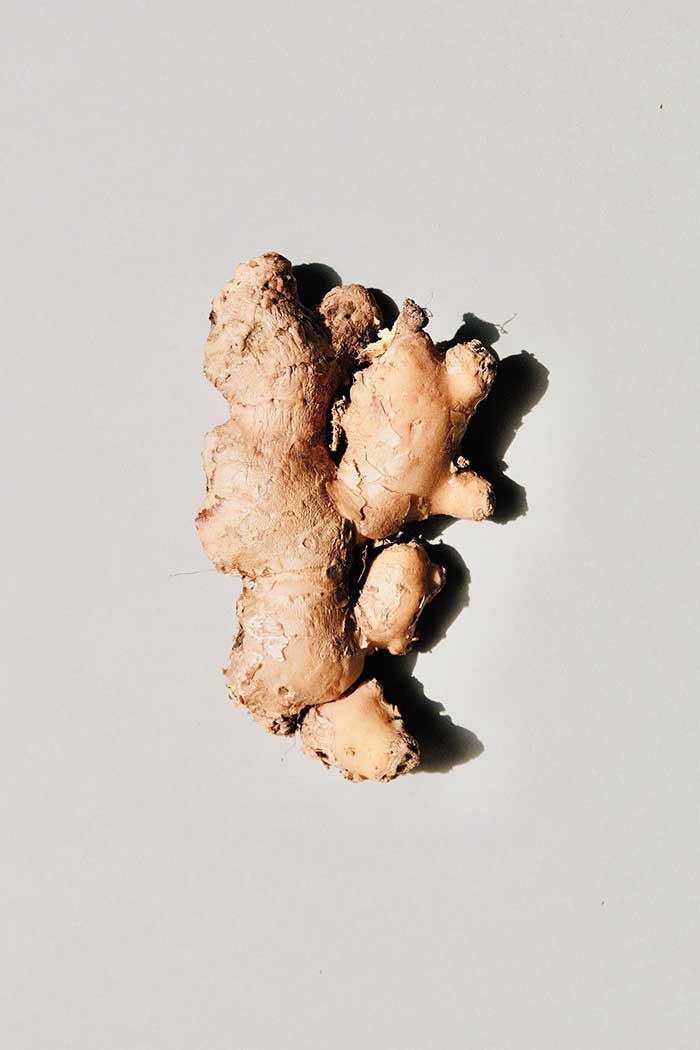
The Profound Health Benefits of Ginger
Learn more about the incredible health benefits of ginger and how this spice can help to optimise your health.
Ginger, known botanically as Zingiber officinale, is the spice that gives gingerbread its flavour, and the root of this plant has been used for thousands of years as both food and medicine.
This is because it has been found to possess numerous health benefits.

For instance, ginger may help relieve nausea in pregnant women or those who have had surgery. It also can reduce inflammation and ease menstrual cramps. Soothe a sore throat, fight infections such as colds and flu and even prevent colorectal cancer.
It can also lower blood pressure, reduce muscle pain and soreness and help to maintain healthy cholesterol levels. Read on to find out more about the extremely powerful and positive effects of this spice.
- Ginger Relieves Nausea
- Ginger Helps Ease Menstrual Cramps
- Ginger Can Soothe a Sore Throat
- Ginger can Relieve Upper Respiratory Tract Infections
- Ginger may help Protect against Colorectal Cancer
- Ginger may have Anti-Diabetic Properties
- Ginger Lowers Blood Pressure
- Ginger Can Reduce Muscle Pain and Soreness
- Enjoy the Taste and Reap the Health Benefits at the Same Time
- Side Effects of Ginger
- Ginger Benefits for Men
- How to Eat Ginger for Health Benefits
- Benefits of Eating Raw Ginger in Empty Stomach
- Benefits of Ginger Tea
- Ginger Medicinal Uses
- Conclusion – The Health Benefits of Ginger
Ginger Relieves Nausea
Ginger is one of the most powerful antiemetics. It has been used for centuries to treat nausea, especially motion sickness. Ginger can also be effective for morning sickness and chemotherapy-induced nausea.
Ginger is an effective remedy for chemotherapy-related nausea and vomiting (CINV). In a study with women undergoing breast cancer treatment, those who received either ginger capsules or ginger powder had lower rates of CINV than those who received placebo.
The study participants were divided into three groups: one group received 1 gram of ginger daily in capsule form; another group received 250 milligrams (0.25 g) daily in powdered form; and the third group received both forms of ginger together at this same dosage. Both doses showed significant reductions in CINV symptoms compared with those taking placebo.
Ginger has been shown to reduce motion sickness symptoms by up to 80 percent within twenty minutes after oral administration.
Ginger Helps Ease Menstrual Cramps
Ginger can help ease menstrual cramps. It’s a natural pain reliever and anti-inflammatory, which makes it a great choice for alleviating the discomfort of menstrual cramps.

Ginger has been used for centuries to treat pain and inflammation. In fact, many women in Asia use ginger tea around their periods because of its ability to reduce bloating and relieve other symptoms of PMS.
To make ginger tea: simmer water with sliced fresh ginger root until fragrant (about three minutes). Strain out the pieces of ginger with a mesh strainer or cheesecloth before drinking your tea. Enjoy.
Ginger Can Soothe a Sore Throat
Ginger is a natural remedy for sore throats.
In addition to providing relief from the pain and symptoms of a sore throat, ginger can also help ease congestion and clear phlegm from your sinuses.
Ginger tea is a simple way to reap these benefits at home.
Ginger can Relieve Upper Respiratory Tract Infections
Ginger is a powerful expectorant, meaning that it can help break up mucus in the lungs.
In addition to helping with congestion, coughs and sore throats, ginger also has anti-inflammatory properties that make it an effective treatment for upper respiratory tract infections (URTI).
The combination of these two characteristics makes ginger one of the best remedies available for relieving URTIs such as colds and flu.
The active ingredient in ginger that helps fight off URTIs is called gingerol.
Gingerol works by breaking down bacterial cell walls so they can be killed by white blood cells or dissolved by stomach acids before they have time to multiply and cause further damage in your body
Ginger may help Protect against Colorectal Cancer
Gingerol also has anti-inflammatory properties and may help prevent cancer.
Ginger has been shown to have anti-cancer properties in cell and animal studies.
Ginger can be eaten raw, cooked or as a tea.
Ginger may have Anti-Diabetic Properties
Acute and chronic consumption of ginger have been shown to have positive effects on blood glucose levels.
In one study, subjects were given 1 gram per kilogram of body weight per day for two weeks followed by 0.5 grams per kilogram per day for another two weeks.
Blood sugar levels were reduced in those who consumed ginger compared to the control group (who did not consume ginger). Another study showed that the supplementation of 1 gram per day significantly improved insulin sensitivity in people with type II diabetes mellitus.

Another study found that consuming 2 grams per day helped reduce the risk of developing Type II diabetes by 13 percent.
Ginger Lowers Blood Pressure
Ginger is a great source of potassium, which helps to regulate blood pressure.
It also contains magnesium and calcium, which also contribute to the regulation of blood pressure.
Ginger has been shown to reduce inflammation in the body, and elevated levels of inflammation have been linked to high blood pressure.
Ginger Can Reduce Muscle Pain and Soreness
Ginger is a natural anti-inflammatory, pain reliever and muscle relaxer. It helps to reduce muscle soreness and even pain by blocking cyclooxygenase enzymes that cause inflammation.
Ginger contains gingerols, shogaols and paradols – the compounds which give ginger its spicy taste. These compounds are responsible for its anti-inflammatory properties.
In addition to reducing inflammation, these powerful substances may also help protect against cancerous cells by stopping their growth or making them more vulnerable to attack by the immune system.
Enjoy the Taste and Reap the Health Benefits at the Same Time
You can enjoy the taste of ginger and reap its health benefits at the same time.
Ginger has a spicy, sweet flavor that comes from its active ingredient, gingerols. The aromatic oils in ginger are released when you cook it or drink it.
It is used as a spice in cuisines around the world and is also used to make other foods including cookies (gingerbread), candies (ginger snaps), beverages (ginger ale) and desserts (gingerbread cookies).
Side Effects of Ginger
Ginger can be a little spicy. Some people may experience mild nausea after taking it, especially if they are sensitive to spicy foods.

Ginger is not recommended for children under 2 years old.
Aside from these relatively mild warnings there are not really any considerable side effects of ginger.
Ginger Benefits for Men
Ginger has been used as a digestive aid for centuries. Ginger is known to help with nausea, motion sickness and inflammation. It can also be used to help ease stomach aches and indigestion.
Ginger contains chemicals such as gingerols that have anti-inflammatory properties and may be helpful in the treatment of arthritis, colitis, gastritis and other inflammatory conditions.
Ginger also helps reduce muscle pain caused by exercise or injury by blocking the production of prostaglandins that cause inflammation.
How to Eat Ginger for Health Benefits
Ginger is a common ingredient in many cuisines, including Indian, Chinese, Japanese, Korean and Thai.
Ginger can be used in soups and stews. You can also add ginger to stir fries and vegetable salads. It’s often added to smoothies for flavour as well as health benefits.
Benefits of Eating Raw Ginger in Empty Stomach
- Ginger can be effectively consumed on an empty stomach
- Ginger is an effective remedy for nausea, vomiting and heartburn
- It helps in relieving the symptoms of morning sickness during pregnancy
- It is also helpful in cases of indigestion and flatulence
Ginger can be taken raw or juiced so that it doesn’t lose its properties if you make a glassful of ginger juice daily.
Benefits of Ginger Tea
Ginger tea is a great way to implement the benefits of ginger. Ginger tea is delicious, too.
The best thing about ginger tea is that it’s easy to make at home. You can buy dried or fresh ginger in most grocery stores, and then make your own tea with it by steeping the root in boiling water for about 15 minutes.
Ginger Medicinal Uses
In addition to its medicinal uses, ginger is also used in traditional medicine as a remedy for many ailments. Ginger has been used for the treatment of colds and sore throats, gastrointestinal discomfort, motion sickness and morning sickness.
Conclusion – The Health Benefits of Ginger
Ginger has been used around the world for thousands of years, and it’s easy to see why. Not only is it delicious, but it’s also great for your health!
Ginger is said to have anti-inflammatory properties, which makes it perfect for reducing muscle pain or soreness after working out.
It can also help soothe a sore throat when you have a cold or flu virus by easing congestion in your chest area.
And did we mention that ginger tea tastes amazing? If you’re looking for some tasty additions to add into your diet today, then add it into smoothies, stir frys and baking.




Pingback: Important Health Benefits of Pine Needle Tea - Outdoor Fitness Society
Pingback: The Incredible Health Benefits of Turmeric - Outdoor Fitness Society